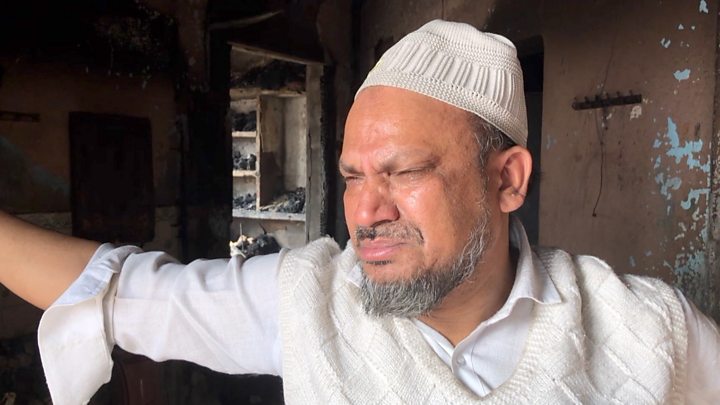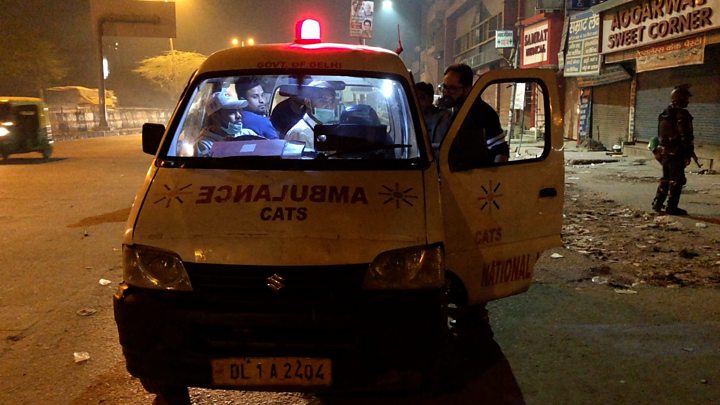Anger as judge critical of Delhi violence removed
The transfer of a judge critical of the violence in Delhi has raised concerns in India, as politicians come under fire for perceived inaction.
Justice S Muralidhar, who was hearing a petition into the religious riots, had sharply condemned both the government and police on Wednesday.
Orders for his immediate transfer came late at night the same day.
More than 30 people have been killed so far in the deadliest violence the Indian capital has seen in decades.
The clashes first broke out on Sunday between protesters for and against a controversial citizenship law in north-east Delhi.
But they have since taken on communal overtones, with reports of many Muslims being attacked.
Even though the violence largely abated on Wednesday, there were reports of sporadic clashes in affected areas overnight and the city remains tense.
On Thursday, focus had shifted to Justice Muralidhar’s transfer from the Delhi high court. His move was first announced nearly two weeks before the violence broke out, but BBC correspondents say that his biting comments in court may have hastened his transfer.
While hearing petitions about the violence, the judge said that the court could not let “another 1984” happen on its “watch”. In 1984, more than 3,000 Sikhs were killed in riots against the community in Delhi.
Videos showing leaders from India’s ruling Bharatiya Janata Party (BJP) inciting Hindu crowds against largely Muslim protesters were played during the cases he was hearing.
Justice Muralidhar then questioned how police were registering complaints and directed the government to ensure that any displaced victims were given temporary shelter as well as medical treatment.
His comments made headlines on Wednesday, with many praising his “courageous stand”.
So the news that he had been removed saw many Indians express concern and outrage.
But the government has maintained that the transfer was done with the judge’s consent and a “well-settled process” was followed.
Justice Muralidhar has not commented on the development.
The law minister, Ravi Shankar Prasad, took to Twitter, where most of the outrage was being expressed, to say it was only a “routine transfer”.
But, a former Delhi High Court judge questioned the timing of the move, asking, “what was the hurry?”
In an interview with news channel NDTV, Kailash Gambhir called the timing of the order “disturbing”.
“The language of the transfer order is not routine,” he added.
Opposition parties also remained unconvinced – and continued to blame the government for the violence.
Opposition leader Sonia Gandhi called for the resignation of Home Minister Amit Shah, saying he was “responsible”.
Delhi Chief Minister Arvind Kejriwal has also been criticised for not coming out when the violence first broke out.
What happened in Delhi?
What initially began as a protest against a controversial citizenship law in north-east Delhi morphed into violent communal clashes on Sunday.
Photographs, videos and accounts on social media painted a chilling image of the city in the last few days – of mostly Hindu mobs beating unarmed men, including journalists; of groups of men with sticks, iron rods and stones wandering the streets; and of Hindus and Muslims facing off.
Many, including journalists, have tweeted and spoken of mobs demanding to know their religion.
Judging by the names released so far, both Muslims and Hindus are among the dead and injured.
The unrest in north-east Delhi was centred around Muslim-majority neighbourhoods – such as Maujpur, Mustafabad, Jaffrabad and Shiv Vihar.
The streets in these areas were littered with stones and shattered glass.
Correspondents described broken and burnt vehicles strewn about, and the stench of smoke from smouldering buildings filling the air.
More than 200 people are injured, according to officials at the Guru Teg Bahadur hospital, where many of them have been admitted.
Source: Read Full Article




